Privy Council Review of intercept as evidence: report - Official ...
Privy Council Review of intercept as evidence: report - Official ...
Privy Council Review of intercept as evidence: report - Official ...
Create successful ePaper yourself
Turn your PDF publications into a flip-book with our unique Google optimized e-Paper software.
CHAPTER II - CURRENT USE OF INTERCEPT<br />
INTERCEPTION IN THE UK<br />
15. Interception <strong>of</strong> communications in the UK is governed by the<br />
Regulation <strong>of</strong> Investigatory Powers Act 2000 (RIPA), which provides various<br />
grounds on which <strong>intercept</strong>ion will have “lawful authority”, including when<br />
conducted under warrant. The term ‘<strong>intercept</strong>ion’ covers a wide variety <strong>of</strong><br />
related techniques, which can give legally authorised access to<br />
communications ranging in sophistication from an ordinary call between two<br />
fixed telephones in the UK to a complex multi-media session *** running<br />
across broadband connections *** (for more detail see Chapter VI). In the<br />
future even more sophisticated media will come onto the market, and<br />
<strong>intercept</strong>ion will have to provide access to <strong>as</strong> many <strong>of</strong> them <strong>as</strong> its targets<br />
choose to use. Interception covers the post <strong>as</strong> well <strong>as</strong> electronic media.<br />
16. Interception in accordance with the UK’s legal framework under RIPA<br />
provides both tactical and strategic information for the intelligence and law<br />
enforcement agencies. Tactical <strong>intercept</strong>ion provides real time intelligence on<br />
the plans and actions <strong>of</strong> individual terrorists, criminals and other targets,<br />
which allows the agencies to disrupt their plans and frustrate their actions. It<br />
can identify <strong>evidence</strong> against the targets and facilitate their arrest. Strategic<br />
<strong>intercept</strong>ion can reveal the existence <strong>of</strong> new targets, <strong>as</strong> well <strong>as</strong> the<br />
significance, long term plans, international connections and modus operandi<br />
<strong>of</strong> existing targets, from which (with intelligence from other sources) a broad<br />
understanding <strong>of</strong> the terrorist and criminal threat facing the UK can be derived<br />
and preventive strategies developed.<br />
THE CURRENT LAW<br />
17. RIPA permits specified intelligence and law enforcement agencies to<br />
<strong>intercept</strong> all forms <strong>of</strong> communications (by post <strong>as</strong> well <strong>as</strong> electronically) on the<br />
authority <strong>of</strong> a warrant given by the Secretary <strong>of</strong> State. A warrant can be given<br />
for any <strong>of</strong> three purposes<br />
In the interests <strong>of</strong> national security<br />
<br />
<br />
For the purpose <strong>of</strong> preventing or detecting serious crime<br />
For the purpose <strong>of</strong> safeguarding the economic well-being <strong>of</strong> the United<br />
Kingdom.<br />
In Scotland, warrants for the purpose <strong>of</strong> preventing and detecting serious<br />
crime are given by Ministers in the Scottish Executive.<br />
18. Before giving a warrant, the Secretary <strong>of</strong> State or Scottish Minister<br />
must be satisfied that <strong>intercept</strong>ion is necessary to obtain the information<br />
required; that the information could not re<strong>as</strong>onably be obtained by other<br />
means; and the <strong>intercept</strong>ion is proportionate to what it seeks to achieve.<br />
Warrants l<strong>as</strong>t for three or six months depending on purpose, but can be<br />
renewed by the Secretary <strong>of</strong> State or Scottish Minister. Warrants covering<br />
<strong>intercept</strong>ion <strong>of</strong> communications or post within the UK can cover only one<br />
person or premises; different telephone numbers etc. used by the same target<br />
Chapter II<br />
8
















